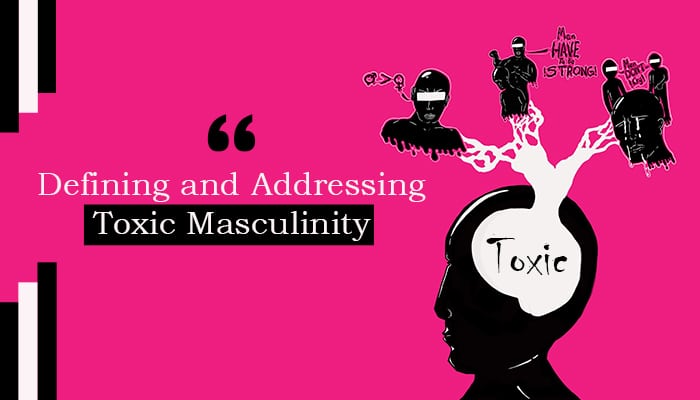
by admin | Nov 28, 2022 | Uncategorized
“Toxic masculinity” (sometimes called “harmful masculinity”) is often used as a catch-all term for the behaviours of men and masculine folks.
In reality, though, there’s plenty of room for someone to be masculine without being toxic or engaging in behaviour that’s dangerous or hurtful.
So what does the phrase actually mean? The popular term points to the very real problems of male violence and sexism.
If you think about the common narrative around men and boys that teaches them that boys don’t cry or that they should be able to walk it off, take it like a man under any circumstance, you could imagine how the habitual practice of not telling about your pain or worries could have significant implications.
There are downstream consequences of lacking a healthy outlet to dispense negative emotions. When you’re bottled up all the time, it’s like Whac-a-Mole. It will reappear in another way.
Common Traits of Toxic Masculinity
Traits of toxic masculinity include themes of:
- Mental and physical toughness
- Aggression
- Stoicism, or not displaying emotion
- Self-sufficiency
- Emotional insensitivity
Societal impact
While toxic masculinity definitely has effects on individuals, it can also have larger societal impacts.
Here are just a few of these impacts. Keep in mind that, while toxic masculinity plays a contributing role in these issues, it isn’t always the sole cause.
Rape culture
Toxic masculinity ideology tends to treat women as sexual objects, contributing to ongoing issues, like rape culture.
This refers to the tendency to remove blame from sexual assaulters and place it on the victim. “Boys will be boys” might sound harmless when it comes to kids roughhousing on the playground. But it can be used as an excuse for violent behavior or not respecting boundaries.
Violence
Toxic masculinity also teaches men and masculine folks that aggression and violence are key to solving problems — unless you want to appear weak.
The resulting violence, which can show up in many forms, including intimate partner violence, can have far-reaching effects on those who aren’t even directly involved.
Social exclusion
Again, there are plenty of men who do not exhibit toxic masculinity. Still, these individuals may be negatively affected by those who display those traits in the form of social exclusion. Especially among children and teens, those who don’t fit inside that predetermined box of what it means to be masculine might find themselves disliked because of it.
Addressing it
There’s no single answer to addressing the problem of toxic masculinity. Doing so requires societal shifts around several things, including gender stereotypes and the stigma surrounding mental health.
But, if you’re a man, there are a few things you can do to reduce the impact of toxic masculinity in both your own life and the lives of those around you:
- Be okay with acknowledging where you are. Everyone has a starting point. There’s no way to change or move forward if you aren’t able to be honest about the things you want to change. Maybe you weren’t a skilled communicator in past relationships. Or maybe you’ve relied on your physical size or strength to intimidate others. Don’t beat yourself up for your past actions. Put your attention on where you currently stand and how you can move forward.
- Have tough conversations. Ask your friends their perspective on how you handle tough situations or your biases in relation to masculinity. Do your part not to get defensive, and really listen to how your actions have impacted others. You might be surprised that certain things you did or said came across differently from how you intended.
- Do the work. Above all, undoing toxic masculinity as a man involves being true to yourself, not some false idea of the person you should be. Finding your true self is a process that takes time. A therapist can guide you through this process and help you alter unhelpful thinking patterns.
by admin | Nov 25, 2022 | Uncategorized
For the first time in Pakistan, White Ribbon, which is part of global men’s movement present in over 50 countries for ending violence against women and girls, has announced the launch of White Ribbon Workplace Gender Inclusion Awards for corporate sector in Pakistan.
Talking to the media Founder and President of White Ribbon Mr. Omer Aftab said that these awards will be presented annually to companies which use their position to advocate for gender equality and take steps to advance women’s empowerment. These awards are being launched on November 25, the White Ribbon Day for the Eradication of Violence against Women.
Mr. Aftab further added that White Ribbon Awards will be presented annually to the companies which advocate for gender equality and take steps to advance women’s empowerment at workplace. The awards will celebrate and acknowledge the best practices and policies of corporates that take part and highlight gender justice and gender inclusion for their workforce, customers, community and through their CSR and brand communication and advertisements.
All organisations that work on gender equality and have shown a positive impact regarding women empowerment at workplace are eligible to apply for these awards. There are three categories of White Ribbon Awards: Gender Inclusive Workplace, Gender Responsive Marketplace and Community Engagement and Partnerships. For all categories, survey forms will have to be submitted online. Finalists will be selected based on independent ranking system. ##
Editor’s note:
Violence against women is a shameful reality across the world. Mostly it is committed by men. It is rooted in gender inequalities, and it still far too often goes unnoticed and unchallenged. The White Ribbon Campaign exists to change this.
Men and boys wearing the White Ribbon declare that they will never commit, excuse, or remain silent about men’s violence against women. White Ribbon is one of the world’s largest male-led campaigns to end men’s violence against women. It started in 1991 in Canada, and is now active in over 50countries across the globe. Every year it is growing stronger as more men and boys realise that women’s and girls’ safety is their issue too.
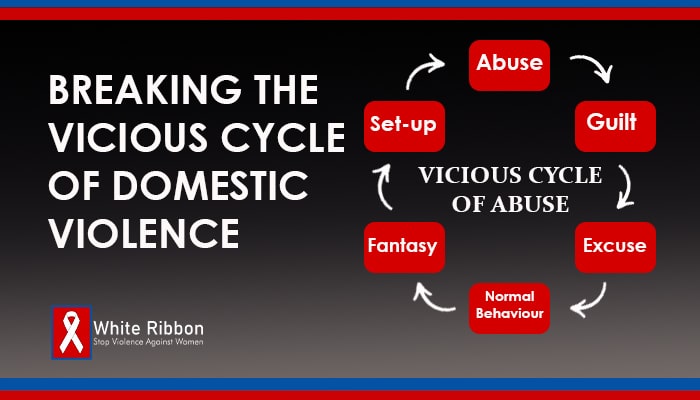
by admin | Nov 15, 2022 | Uncategorized
Domestic abuse frequently follows a cycle. The first step towards ending the cycle of violence is to comprehend it (and the elements that contribute to it). Domestic abuse typically follows a pattern or cycle of violence:
The White Ribbon Campaign aims to end the vicious cycle of domestic violence in which abusive people engage in aggressive, disrespectful, or violent behavior. This sets off a vicious cycle of abuse. Abuse is a technique to show dominance over you and let you know “who is boss.” He exhibits guilt after abusing because he fears getting caught and suffering the consequences of his abusive behaviour. The abuser will next attempt to justify his actions by making a variety of justifications or blaming the victim for his actions, all to escape responsibility. Domestic abuse frequently follows a cycle. The abuser then makes every effort to retake control and maintain the relationship with the victim. He can put on a fake smile or pretend to be happy. The victim could feel hopeful during this calm honeymoon period that the abuser has changed this time. The abuser then starts to dream about abusing the victim once more and looks for an opportunity to make his desire come true. You may be set up by him and he may be able to carry out his plan, which will allow him to abuse you without fear of retribution. It might be challenging to leave, report, or receive any kind of aid when the abuser makes sincere excuses and kind gestures in between periods of violence. He might try to convince you that you are the only one who can help him, that this time will be different, and that he does love you. The abuser may employ tricks to prevent you from seeking help and leaving them. If you think your abusive partner will start acting differently or that you can assist him to deal with his emotional and psychological issues, you are probably mistaken. Violence will continue. Only once your abuser stops blaming you, his miserable background, stress at work, his drinking, and other factors for his actions and seeks professional treatment will he be able to change.
Keep in mind that violence is a purposeful and well-thought-out action. Abusers choose who they attack; they don’t insult, threaten, or physically harm everyone who upsets them. When and where they abuse is carefully considered; abusers maintain control until no one else is present to witness their abusive behavior.
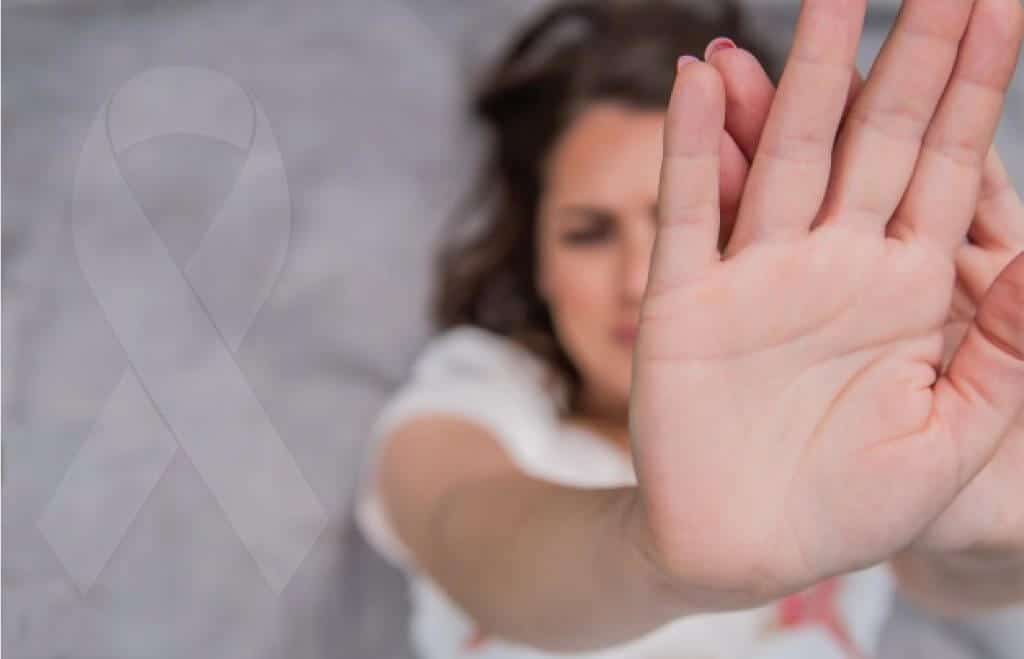
by admin | Oct 25, 2022 | Uncategorized
Like other parts of the globe, the International Day for the Elimination of Violence against Women is being marked here on Saturday (today) with a resolve to continue efforts for putting an end to violence against women. The day is marked every year on November 25, to show support and solidarity with women suffering various kinds of violence. To mark the day, different events including walks, seminars have been planned to raise awareness against violence against women.
The White Ribbon Campaign is launching “16 Days of Activism” campaign against violence against women on Saturday. A spokesperson of the NGO told Business Recorder that one in every five women experienced gender-based violence in Pakistan, which contributes to Pakistan’s low ranking in the global gender gap index.
She called for behavioural changes among men, and said that men must take greater responsibility to become part of the solution. She said, “There are 15 or 16 laws addressing violence against women and children, we people still need to be made aware of these laws. Victims and law enforcement agencies need to be made aware that laws have been promulgated for their protection.”
According to Asian Development Bank report, a staggering 85 percent of women in Pakistan have experienced some form of violence at some point in their lives. Punjab Chief Minister Shehbaz Sharif, in his message said the role of the women in the process of national development is praiseworthy and the importance of their role in the development of Pakistan cannot be denied.
“Dream of prosperity can be materialized by first empowering the women,” he said, adding: “Any injustice meted out with the women is equivalent to cruelty.” He said that provision of resources for empowering the women is a beneficial investment for the constitution of an enlightened society. Giving details about different steps taken by the Punjab government for the welfare of the womenfolk, he said that effective legislation has been made to protect their rights as well as to eliminate the menace of torture in the society.Copyright Business Recorder, 2017
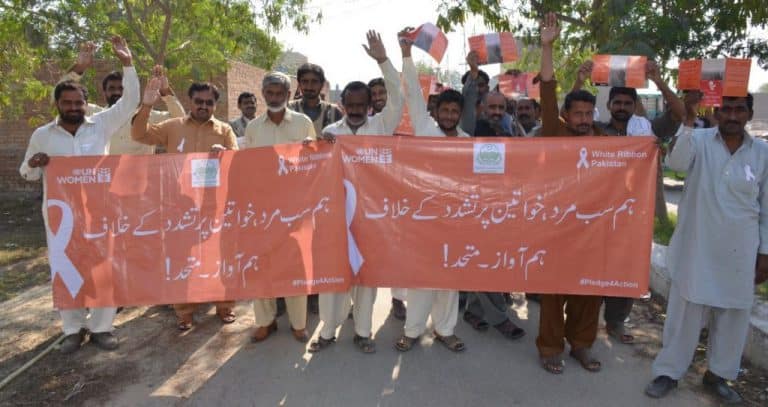
by admin | Oct 25, 2022 | Uncategorized
ISLAMABAD: A nationwide men’s movement for ending violence against women was launched on Friday to mark 16 days of activism.
Thousands of men and boys from over 70 districts across the country will be mobilised by the White Ribbon Pakistan in collaboration with UN Women Pakistan, the National Commission on the Status of Women (NCSW) and the Ministry of Human Rights.
According to the White Ribbon, men from all provinces and regions gathered outside local press clubs to vow to “leave no woman or girl behind” by prioritising their dignity and calling for their protection against violence. The launching ceremony of the campaign was held in Serena Hotel Islamabad.
The International Day for the Elimination of Violence against Women is marked on Nov 25 every year. The day also marks the start of the ‘16 Days of Activism against Gender Based Violence’ lasting until Dec 10, the Human Rights Day.
Speaking on the occasion, Senator Farhatullah Babar said intolerance and violence was increasing day by day in Pakistan.
“Lack of access to justice, broken criminal justice system, jirgas that exclude and degrade women and misapplication of Qisas laws have further compounded violence against women,” he said.
He said pardon can be granted under the Qisas law but only after conviction and it was a misinterpretation of the law by accepting pardons even before conviction.
He suggested developing a national register to catalog crimes against women and called it ‘National register of embarrassment’.
The senator emphasised appointing special public prosecutors for crimes against women and increasing the participation of women in local governments.
Omer Aftab, the CEO of White Ribbon, said violence against women was a global phenomenon affecting one in three women, and Pakistan was no exception.
NCSW Chairperson Khawar Mumtaz said: “The NCSW has planned a national survey to monitor prevalence of violence which will serve as a baseline to check further progress.”
Secretary Ministry of Human Rights Rabiya Javeri Agha said: “Despite many government initiatives, forces of patriarchy continue to hamper women’s inclusive and sustainable growth.”
Sangeeta Thapa, the deputy representative of the UN Women Pakistan, read out UN Secretary General António Guterres’ message for the day.
Published in Dawn, November 25th, 2017
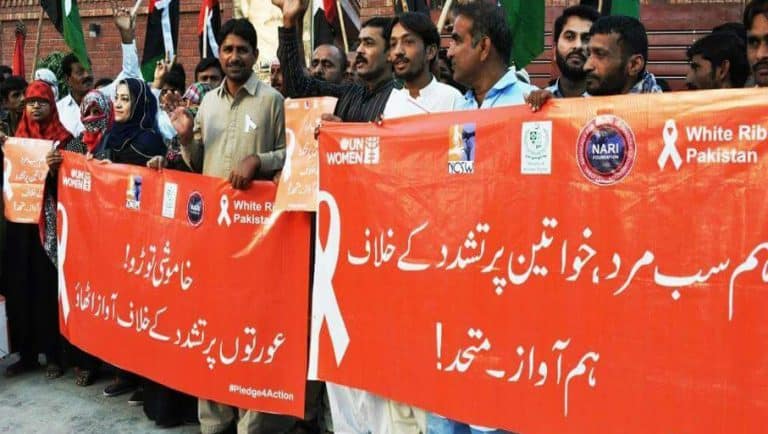
by admin | Oct 25, 2022 | Uncategorized
Sukkur, Friday 24 November 2017: Different organizations including UN women, NARI foundation, NCSW and White Ribbon Pakistan marked the International Day for the Elimination of Violence against Women in Sukkur with the theme “Break silence and raise voices for violence against women”.
In this regard, an awareness walk was held in front of Press Club Sukkur. The walk was attended by a large number of members of PPP and social welfare officers including Fatima Mangi, Anwar Mahar, Safia Baloch, Bisma Waseem, Azra Jamal and others.
The main objective of the walk was to assemble everyone to raise voice on the matter of Gender Violence. Talking on the occasion, participants of the walk said that violence against women can only be ended when men and women will start working as a mutual force.
They said that we all have to raise our voices against the brutalities over women.White Ribbon Pakistan and NARI foundation Sukkur also announced a global campaign on the 16 Days of Activism Against Gender-Based Violence in all areas of Sukkur which will start from 25 November through 10 December against the backdrop of an unprecedented global outcry. 02





